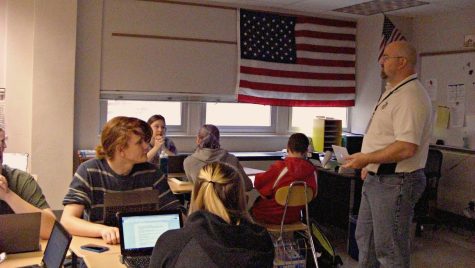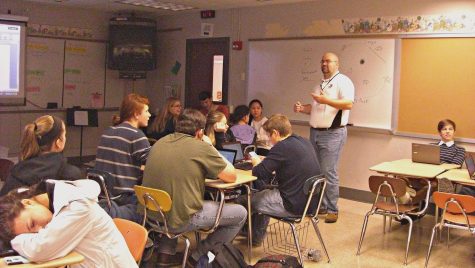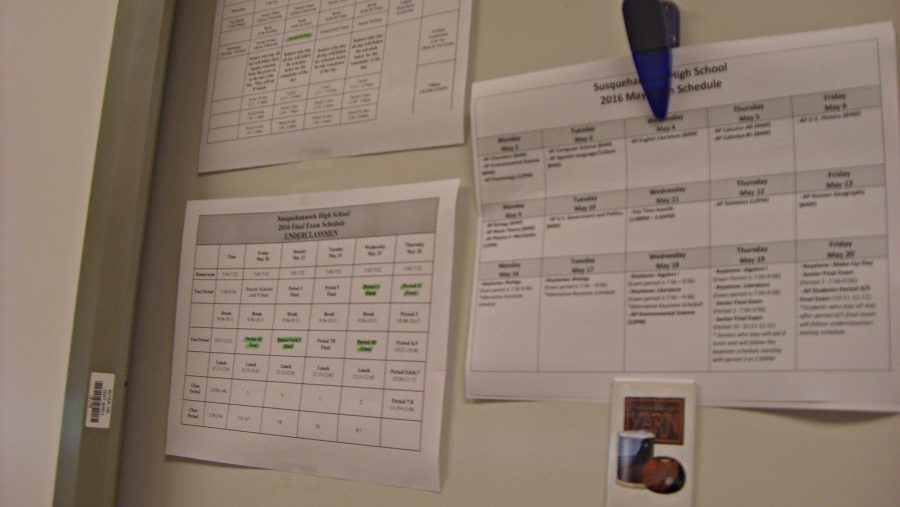Teachers Give Study Tips
May 9, 2016
The end of the school year is approaching rapidly, and as much as students can’t wait for summer to arrive, they’re still stuck stressing out about how well they’ll do on their final tests.
Keystones and finals have been the primary focus for students right now. Students strive to get good grades and stay ahead of these tests, but some find it hard to get out of the final and to pass the Keystones.
Here’s a guide to studying for these end of the year tests.
Find the Time to Study
May is that month of the year when everything is happening. From Prom to finals week, the end of the year can be a bit stressful for some students.
If you’re taking these tests, you’ll need to rearrange your schedule to find the time to study. Spend a couple of hours out of your week to review a subject you’ve been struggling with. That way you’ll have a better understanding of it by the time you take the test.
There are several sites that can help you study, as well. Take the time to go to KhanAcademy to work on some practice problems. This way, you’ll be well-prepared for the big test.
History teacher Adam Hinton thinks that spacing out your study time is an easier way to study for a big test.
“Don’t cram. Do not wait until the day before the test or the final to start studying. It doesn’t do you any good. If you pay attention in class and understand what’s going on, as the days progress you won’t need to study too much,” said Hinton. “I think you can study at any time of the day, but the worst times are staying up too late. It won’t work, and you’ll be sleepy and drowsy. When you leave school, go home— take a half-hour break, and find something to eat. Afterwards, take an hour to study.”

Stay Calm and Don’t Stress
What a lot of students tend to do is stress over these tests. When taking a test, it’s harder to concentrate on the problem when you’re worried about what score you’ll get on it.
If you’re feeling stressed about your upcoming final or Keystones, you should try motivating yourself to do great on it. When studying for a test, you’ll be more prepared for it.
Instead of doubting your ability, motivate yourself with good thoughts and messages.
Math teacher Elizabeth Surguy believes that exercising and listening to music in between studying your notes is a good way to relieve stress.
“Unfortunately, it’s hard to get away from [the stress]. I think a huge part of that is due to procrastination. I’ve been there, and it happens all the time. But if you prepare in chunks, and that’s what I’ve been trying to do with some of my classes, which is slowly review, rather than having this one jam-packed review in the end, it will help,” said Surguy. “Find ways in between those times to relieve stress, such as exercising or listening to music, or doing something else that you enjoy.”
Study with a Peer
Studying alone can take a while, and, if you’re confused on something, you don’t have anyone that can help you. If you study with a peer in the same class with you, who is also taking the final or Keystone, then you will have more help with the subject.
With your peer, the two of you have more notes and will have a better understanding of the subject. Extra help is always a great advantage, and you can also quiz each other on some problems.
English teacher Martha Smith thinks that studying with a fellow student gives you a better understanding of the subject and shows how well you can grasp the concept.
“I personally like flashcards. I like Quizlet and partner studying. If you can explain a concept to someone else, then you can grasp it pretty well, so studying with someone else seems to help, as well,” said Smith. “I have seen peer interactions fail horrifically because one peer is off task and not helping the other one study… You want to pick someone who has the same academic goals that you have.”

Ask a Teacher for Help
While looking through your notes, you’re going to stumble upon a section you’re really confused on and probably forgot about throughout the year. If no one else can help you, the best person to go to is your teacher.
Your teacher can help give you a better understanding of the problem. If you need a lot of help on the subject, try scheduling a time to meet with them. You can stay after school or schedule a time during your lunch period to talk with them.
Teachers will always be there to help you with something you’re struggling with.
Science teacher Lauren Jernstrom knows many of the teachers in the school will be willing to spend time after school to help their students study.
“You’ll need to review all of the posted material we’re offering and to ask questions about things you don’t understand,” said Jernstrom. “Just let [the teachers] know, and we can stay after school at any time.”
Get a lot of Rest
You don’t have a lot of concentration with you when you’re tired. Getting a good amount of sleep at night and eating a good breakfast helps you really focus on your test.
Make sure to set a time for yourself when you need to go to bed. If you’re usually up late, then set an earlier bedtime for the following week when the tests are going on.
Good breakfasts will also give you an advantage. Don’t eat a really small breakfast, or no breakfast at all. If you have trouble finding the time to eat breakfast, the school cafeteria is always open in the morning to serve you.
Science teacher Edward Bailey believes getting a good amount of sleep and eating a healthy breakfast is a great way to start off the day.
“I would say to get a normal amount of sleep, or a little more. Some people need more or less sleep than others, but I would definitely try and get a good meal and a good night sleep. Don’t do anything different, and don’t try anything that would compromise your sleep. Don’t watch TV or play video games at the last minute. Just have a nice, easy relaxing night,” said Bailey. “A well-balanced breakfast is good. Something with some protein in it and with some carbs. For me, it would be a good eggs and bacon breakfast.”
Make sure to study over your notes, ask for help, and get a lot of rest for the tests. Keystone testing begins on May 16, while finals begin on May 20.





